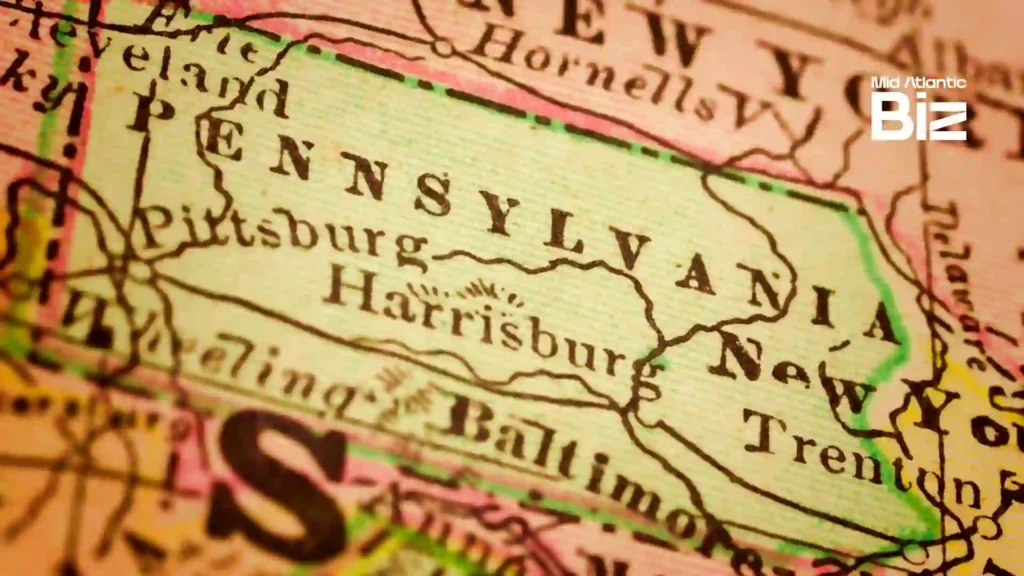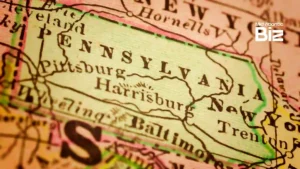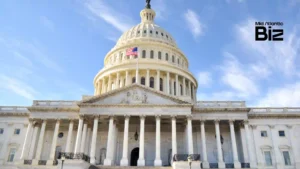
[Mid Atlantic Biz] Pennsylvania, often referred to as a political bellwether, plays a pivotal role in shaping the national political landscape. Recent political shifts in the state have not only captured national attention but also hold significant implications for regional economic policies and the Mid-Atlantic economy as a whole. As businesses, policymakers, and residents adjust to the evolving political dynamics, understanding these changes and their potential impacts is essential for strategic planning and economic growth.
This article examines Pennsylvania’s political realignment, explores its implications for economic policies in the state, and highlights the broader effects on the Mid-Atlantic region. From shifts in infrastructure investment to labor regulations and energy policies, these developments are set to influence the state’s business climate and economic trajectory.
Understanding Pennsylvania’s Political Shift
Pennsylvania’s political landscape has long been characterized by a delicate balance between urban and rural interests, industrial and service economies, and Democratic and Republican influences. Recent elections, however, have highlighted significant changes in voting patterns and policy priorities.
- Urban Dominance vs. Rural Resilience: Pennsylvania’s urban centers, including Philadelphia and Pittsburgh, remain Democratic strongholds, driven by diverse, progressive populations. Meanwhile, rural areas have increasingly leaned Republican, reflecting conservative values and concerns about issues like agriculture, energy, and economic revitalization.
- Suburban Swing Counties: Suburban regions, particularly those surrounding Philadelphia, have emerged as crucial battlegrounds. Shifting demographics and changing voter priorities have made these areas key to electoral outcomes and policy focus.
- Youth and Diversity: The state’s younger and more diverse population has played a growing role in shaping political trends, with issues like climate change, social equity, and economic opportunity taking center stage.
This evolving political environment is reshaping Pennsylvania’s economic policies, as lawmakers and stakeholders aim to address the diverse needs of constituents.
Implications for Regional Economic Policies
1. Infrastructure Investment and Development
Pennsylvania’s aging infrastructure, including roads, bridges, and public transit systems, has long been a concern for residents and businesses. Political shifts in the state have brought infrastructure investment to the forefront of policy discussions, aligning with federal initiatives to modernize the nation’s transportation networks.
- Increased Federal Funding: The state stands to benefit from federal infrastructure spending, with bipartisan support for projects that enhance connectivity and logistics. Key projects, such as upgrades to the Pennsylvania Turnpike and expansion of public transit in urban areas, are expected to drive economic growth.
- Rural Infrastructure Focus: In response to political pressure from rural constituencies, there is likely to be increased investment in broadband expansion and rural road improvements. These projects can help bridge the digital divide and create new opportunities for rural businesses.
- Economic Impact: Improved infrastructure can reduce transportation costs, enhance supply chain efficiency, and attract investment, benefiting industries such as manufacturing, logistics, and retail.
2. Labor Policies and Workforce Development
Pennsylvania’s political shifts have also brought labor issues to the forefront, with implications for wages, workforce development, and unionization efforts.
- Minimum Wage Increases: While the state’s minimum wage remains aligned with the federal level, there is growing political momentum for raising it, particularly in urban and suburban areas. Businesses must prepare for potential wage hikes by evaluating labor costs and exploring strategies to improve workforce productivity.
- Union Influence: Pennsylvania has a strong tradition of organized labor, particularly in sectors like manufacturing and construction. Recent political developments may lead to renewed efforts to strengthen unions and expand collective bargaining rights, which could influence labor relations and operational strategies for businesses.
- Workforce Development Initiatives: Addressing the skills gap is a priority for policymakers. Investments in vocational training, apprenticeship programs, and partnerships with educational institutions aim to equip workers with the skills needed for high-demand industries like healthcare, technology, and advanced manufacturing.
3. Energy and Environmental Policies
As a major energy producer, Pennsylvania is at the center of debates over energy policy and environmental sustainability. Political shifts in the state have highlighted the tension between supporting traditional energy industries and advancing renewable energy initiatives.
- Natural Gas and Fracking: Pennsylvania is a leading producer of natural gas, and the fracking industry remains a significant economic driver. Political support for the industry varies, with rural and Republican constituencies advocating for continued development, while urban and Democratic groups push for stricter regulations and environmental safeguards.
- Renewable Energy Growth: The state has seen increased investment in renewable energy projects, such as wind and solar farms, driven by federal incentives and growing demand for sustainable energy sources. Businesses involved in clean energy can capitalize on these trends by aligning with state and local policies that promote green initiatives.
- Carbon Emission Reductions: Pennsylvania’s participation in the Regional Greenhouse Gas Initiative (RGGI) reflects a commitment to reducing carbon emissions. While this policy has faced opposition from certain industries, it presents opportunities for companies that prioritize sustainability and innovation.
4. Economic Development and Business Incentives
Pennsylvania’s political shifts have influenced approaches to economic development, with an emphasis on fostering innovation, attracting investment, and supporting small businesses.
- Tax Incentives for Businesses: Policymakers are exploring tax incentives and grants to attract businesses to the state, particularly in sectors like technology, life sciences, and advanced manufacturing. These measures aim to stimulate job creation and enhance competitiveness.
- Small Business Support: Recognizing the importance of small businesses to the state’s economy, there is a push for programs that provide access to capital, technical assistance, and resources for entrepreneurship. Initiatives targeting women- and minority-owned businesses are also gaining traction.
- Regional Collaboration: Efforts to promote regional collaboration, such as partnerships between cities and rural areas, can help balance economic growth and address disparities in access to resources and opportunities.
5. Education and Innovation
Education and innovation are critical components of Pennsylvania’s economic future, and political shifts are shaping policies that prioritize these areas.
- Investments in Education: Increased funding for K-12 education and higher education institutions is expected, reflecting voter priorities. Expanding access to quality education can help address workforce challenges and enhance economic mobility.
- Support for Research and Development: Pennsylvania’s universities and research institutions, such as Carnegie Mellon and the University of Pennsylvania, are key drivers of innovation. Policies that support R&D, technology transfer, and commercialization can fuel growth in emerging industries.
- Technology Adoption: Political support for digital transformation and smart city initiatives can create opportunities for businesses to implement cutting-edge technologies that improve efficiency and services.
Broader Implications for the Mid-Atlantic Region
Pennsylvania’s political shifts have implications beyond its borders, influencing regional economic policies and collaboration across the Mid-Atlantic. As a major transportation hub and energy producer, Pennsylvania plays a critical role in the regional economy. Policies that enhance infrastructure, support workforce development, and promote innovation can strengthen the region’s competitiveness and attract investment.
Additionally, Pennsylvania’s approach to issues like climate change and trade can set a precedent for neighboring states, shaping regional strategies and priorities. By aligning with federal initiatives and fostering collaboration with other Mid-Atlantic states, Pennsylvania can position itself as a leader in driving economic growth and resilience.
Conclusion: Navigating Change and Seizing Opportunities
Pennsylvania’s political shifts present both challenges and opportunities for businesses, policymakers, and residents. By understanding the implications of these changes and adapting to evolving priorities, stakeholders can navigate the uncertainties of the current environment and capitalize on new prospects for growth.
For businesses, staying informed about policy developments, engaging with local leaders, and investing in innovation and workforce development will be essential for success. As Pennsylvania continues to adapt to its changing political and economic landscape, the state has the potential to drive progress and prosperity not only for itself but also for the broader Mid-Atlantic region.












